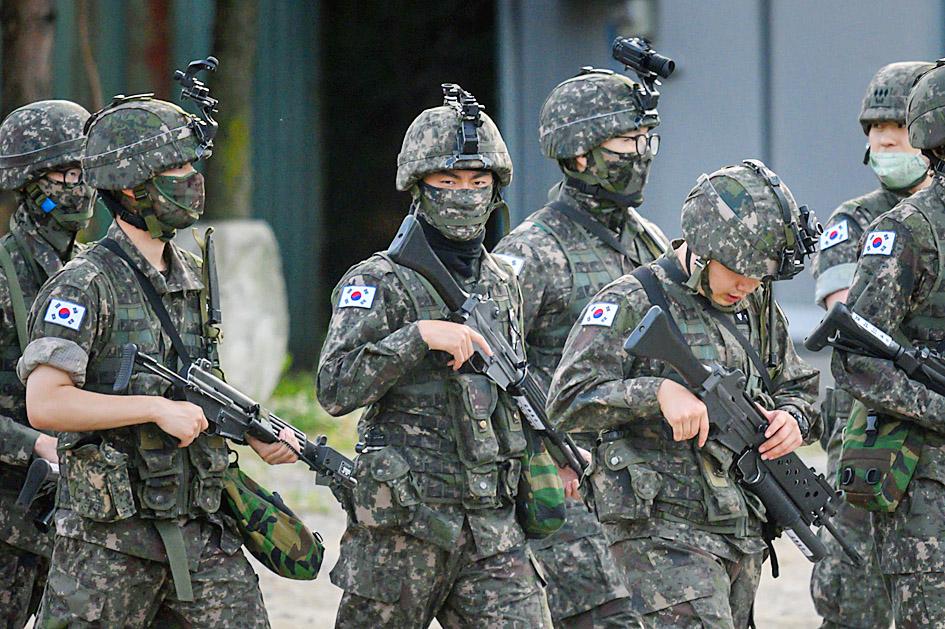North Korea yesterday blew up an office set up to foster better ties with South Korea in a “terrific explosion” after it threatened to take action if North Korean defectors went ahead with a campaign to send propaganda leaflets into the North.
The North’s Korean Central News Agency (KCNA) news agency said that the liaison office in the border town of Kaesong, which had been closed since January due to the COVID-19 pandemic, was “tragically ruined with a terrific explosion.”
Black-and-white surveillance footage released by the South Korean Ministry of National Defense showed a large explosion that appeared to bring down the four-story structure.

Photo: AFP
The blast also appeared to cause a partial collapse of a neighboring 15-story high-rise that had served as a residential facility for South Korean officials who staffed the liaison office.
The office, when it was operating, effectively served as an embassy for the old rivals and its destruction represents a major setback to efforts by South Korean President Moon Jae-in to coax the North into cooperation.
South Korea yesterday convened an emergency National Security Council meeting and said that it would respond sternly if North Korea continued to raise tensions.
The destruction of the office “broke the expectations of all people who hope for the development of inter-Korean relations and lasting peace on the peninsula,” South Korean Deputy National Security Adviser Kim You-geun told a briefing.
“We’re making clear that the North is entirely responsible for all the consequences this might cause,” he said.
North Korea, whose nuclear and missile programs are the subject of stalled talks with the US, and the democratic South are technically still at war because their 1950-1953 conflict ended in a truce, not a treaty.
Tension has been rising over the past few days with the North threatening to cut ties with the South and retaliate over the propaganda leaflets, which carry messages critical of North Korean leader Kim Jong-un, including on human rights.
The demolition was “unprecedented in inter-Korean relations” and a “nonsensical act that should have not happened,” South Korean Vice Minister of Unification Suh Ho, who coheaded the liaison office, told reporters.
KCNA said that the office was blown up to force “human scum and those, who have sheltered the scum, to pay dearly for their crimes.”
North Korea refers to defectors as “human scum.”
A South Korean military source told Reuters that there had been signs that North Korea was going ahead with the demolition earlier in the day, and South Korean military officials watched live surveillance imagery as the building was blown up.
The first diplomatic mission of its kind, the liaison office was established in 2018 as part of a series of projects aimed at reducing tensions between the two Koreas.
In 2018, South Korea spent at least 9.78 billion won (US$8.1 million at the current exchange rate) to renovate the building.
On Saturday, North Korean state media reported that Kim Yo-jong, the sister of the North Korean leader, who serves as a senior official of the ruling Workers’ Party, had ordered the department in charge of inter-Korean affairs to “decisively carry out the next action.”
“Before long, a tragic scene of the useless north-south joint liaison office completely collapsed would be seen,” she was reported as saying.

The combined effect of the monsoon, the outer rim of Typhoon Fengshen and a low-pressure system is expected to bring significant rainfall this week to various parts of the nation, the Central Weather Administration (CWA) said. The heaviest rain is expected to occur today and tomorrow, with torrential rain expected in Keelung’s north coast, Yilan and the mountainous regions of Taipei and New Taipei City, the CWA said. Rivers could rise rapidly, and residents should stay away from riverbanks and avoid going to the mountains or engaging in water activities, it said. Scattered showers are expected today in central and

COOPERATION: Taiwan is aligning closely with US strategic objectives on various matters, including China’s rare earths restrictions, the Ministry of Foreign Affairs said Taiwan could deal with China’s tightened export controls on rare earth metals by turning to “urban mining,” a researcher said yesterday. Rare earth metals, which are used in semiconductors and other electronic components, could be recovered from industrial or electronic waste to reduce reliance on imports, National Cheng Kung University Department of Resources Engineering professor Lee Cheng-han (李政翰) said. Despite their name, rare earth elements are not actually rare — their abundance in the Earth’s crust is relatively high, but they are dispersed, making extraction and refining energy-intensive and environmentally damaging, he said, adding that many countries have opted to

SUPPLY CHAIN: Taiwan’s advantages in the drone industry include rapid production capacity that is independent of Chinese-made parts, the economic ministry said The Executive Yuan yesterday approved plans to invest NT$44.2 billion (US$1.44 billion) into domestic production of uncrewed aerial vehicles over the next six years, bringing Taiwan’s output value to more than NT$40 billion by 2030 and making the nation Asia’s democratic hub for the drone supply chain. The proposed budget has NT$33.8 billion in new allocations and NT$10.43 billion in existing funds, the Ministry of Economic Affairs said. Under the new development program, the public sector would purchase nearly 100,000 drones, of which 50,898 would be for civil and government use, while 48,750 would be for national defense, it said. The Ministry of

UNITED: The other candidates congratulated Cheng on her win, saying they hoped the new chair could bring the party to victory in the elections next year and in 2028 Former Chinese Nationalist Party (KMT) lawmaker Cheng Li-wun (鄭麗文) yesterday won the party’s chair election with 65,122 votes, or 50.15 percent of the votes. It was the first time Cheng, 55, ran for the top KMT post, and she is the second woman to hold the post of chair, following Hung Hsiu-chu (洪秀柱), who served from 2016 to 2017. Cheng is to succeed incumbent Eric Chu (朱立倫) on Nov. 1 for a four-year term. Cheng said she has spoken with the other five candidates and pledged to maintain party unity, adding that the party would aim to win the elections next year and